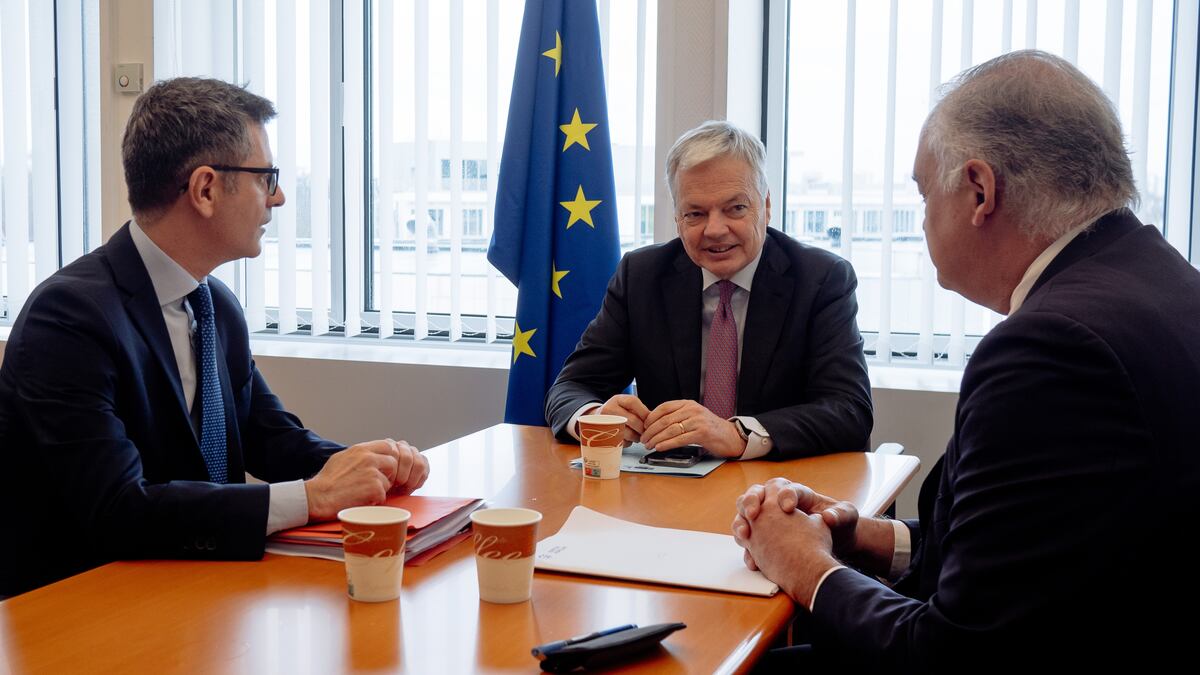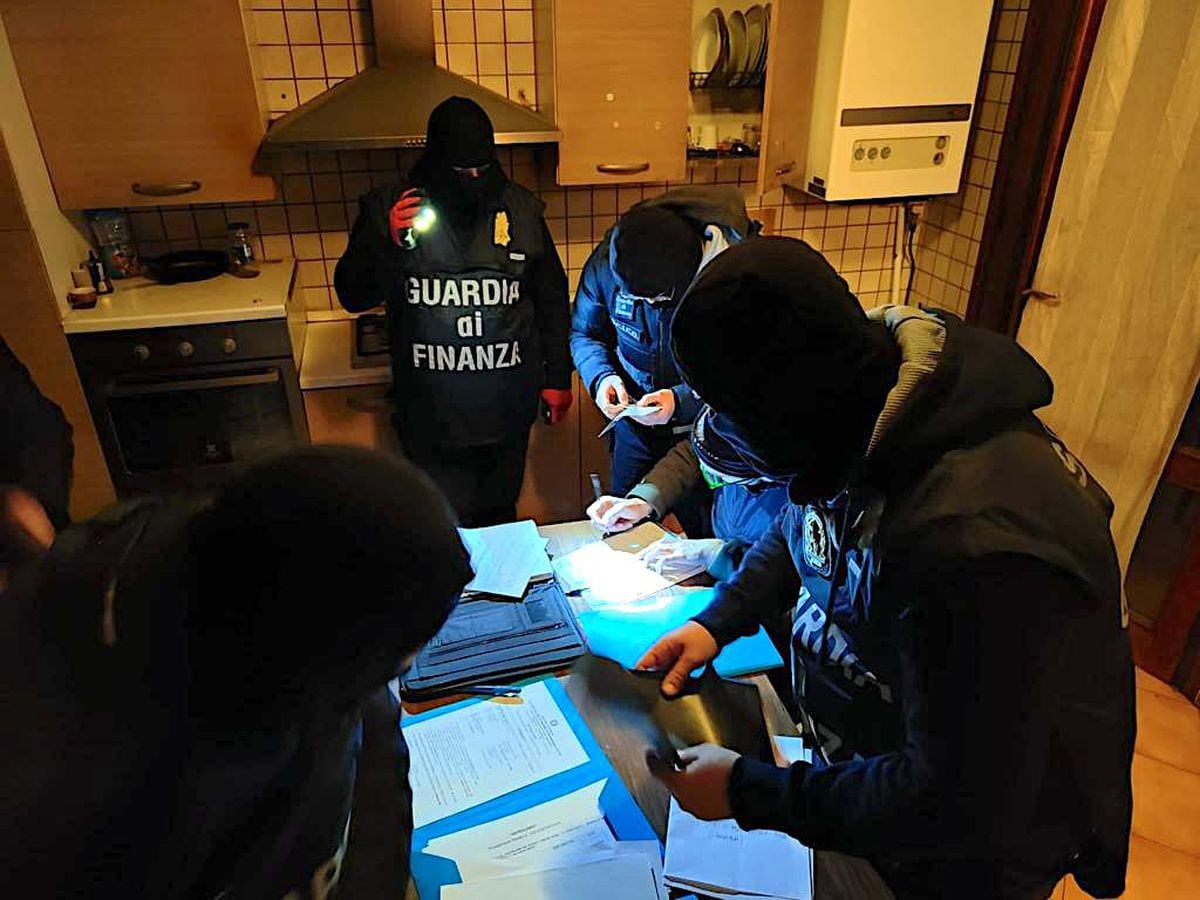Pablo Casado greets the President of the European Parliament, Roberta Metsola, this Wednesday in Brussels. DAVID MUDARRA
The PP does not find a crack in Brussels for its offensive against the Government's management of European funds.
He has tried it with statements, with trips to the community capital to meet with conservative European officials and also with questions to the European Commission, both oral and written.
But, for now, those of Pablo Casado hit a wall.
In the best of cases, the popular ones find themselves with a very formal answer: "The Commission cannot comment on the ongoing reform processes."
At worst, they run into open support for the decisions of the Executive chaired by Pedro Sánchez.
Neither Casado nor the popular mayors who have come to Brussels to complain about the management of the Government of their country have managed to be received by those directly responsible for the recovery plan.
One of the most recent examples of European support for the Government is the response received by MEPs Dolors Montserrat and Isabel Benjumea last Friday.
Both had asked the Community Executive in November, led by the popular Ursula von der Leyen, if the reform of "42 union headquarters" with "100 million European funds" was a "partisan use" of money.
The answer rejects it outright: "The Commission understands that these investments are part of investment four of component 11 of the Spanish recovery and resilience plan."
More information
Casado directs his crusade against the funds to Europe and the EU hopes that the plan will be implemented "as agreed"
In that same response, signed by the Commission's vice-president, the Latvian Valdis Dombrovskis, also from the popular family, it is recalled that "the accumulated union patrimony is a real estate asset of the Spanish central Administration (that is, of public property) the which is made available to unions and employers […] as provided for in Law 4/1986″.
Dombrovskis appreciates that the investment serves to "increase the number of facilities with a high energy rating and promote the implementation of photovoltaic solar systems or other renewable energies in Administration facilities."
This did not discourage Casado.
The answer came last Friday and three days later, this Monday, the popular leader returned to the fray during his visit to Brussels: "We do not agree that [money] be given to projects that are not essential, such as, for example, , about cetaceans or about the digitization of archives from 70 years ago […] or the renovation of union headquarters”.
That same day, PP parliamentarians presented another written question about the investment in union assets to find out if there has been "competitive competition" in the assignment.
Still no answer.
There is also no answer to a series of questions asked in December, even before the Community of Madrid filed a lawsuit for the distribution of nine million of the funds between regions.
They allude to the lack of transparency in the allocation of European money or wonder "how the Commission believes that" the massive march "of senior officials from the Ministry of Economic Affairs, which Nadia Calviño directs, can affect" its management.
But beforehand there are questions in which the steps taken by the Spanish Government are questioned.
Since last year, there have been about twenty questions, of which about half have been answered.
The parliamentarian who has formulated the most is Isabel Benjumea, who in January questioned Vice President Dombrovskis and the Commissioner for the Economy, Paolo Gentiloni, in the European Parliament and saw how both closed ranks in support of the Spanish plan.
If one thing is clear from the Commission's responses, it is that they are going to defend their own administration, which has so far given its approval to the plan presented by the Government of Pedro Sánchez and all the steps it has taken.
Spain has been, in fact, the first country to receive the funds corresponding to the first payment, 10,000 million, which must be added to the 9,000 million of the advance received for the pre-financing.
That, until now, unites both executives.
One of the most recent responses, from January 25, has to do with possible delays in the flagship projects of the Spanish plan, the Strategic Projects for Economic Recovery and Transformation (PERTE).
The question was asked on November 8.
“On November 5, 2021, Spain notified the Commission of an aid measure to support the PERTE plan for the electric and connected vehicle.
Once the notification was completed (...), the Commission approved the measure on December 9, fully respecting the established deadline.”
In that same interpellation, he also wonders if the decree that eliminated bureaucratic obstacles so that aid would arrive quickly to companies is enough: "The milestone has been satisfactorily fulfilled."
The mayor of Madrid, José Luis Martínez-Almeida, this Wednesday in Brussels.Twitter Martínez-Almeida
The popular offensive is especially virulent in the management and regional distribution of funds.
There, the Spanish conservatives have also received a very recent response from their co-religionist Dombrovskis.
Questioned about how he planned to guarantee that "regional and local entities participate in the design and development of reforms and investments", the community vice president replied that "during its contacts with the Member States, the Commission has recalled the importance of starting a dialogue" with these administrations.
On the execution of the money, the vice president ditches: “In their recovery and resilience plans, the Member States must demonstrate that they have implemented the relevant provisions to guarantee complementarity and avoid double financing.
Member States had to describe in detail the specific processes and structures put in place at national, regional and local level to ensure complementarity and coordination of the management of the different EU sources”.
In other words, from what has been seen so far, the Commission does not find any problems or, otherwise, it would not have allowed the plan to continue its course.
The suspicions about the management made with communities, which last year received 11,427 million from the plan and will manage 54% of the funds, have been the issue that has had the most prominence almost from the beginning.
One of them was the one raised in February 2021 on account of criticism made in Spain.
The Community Executive's response was one of those formal responses: "The Commission encourages the Spanish authorities to intensify cooperation efforts between the different levels of government."
And, in addition, it makes it clear that the distribution does not have to be the same for all because "the crisis has not affected all regions and localities in the same way".
Exclusive content for subscribers
read without limits
subscribe
I'm already a subscriber



/cloudfront-eu-central-1.images.arcpublishing.com/prisa/W3IPUQJVVJGIRIK7S64EZBRHH4.jpg)
/cloudfront-eu-central-1.images.arcpublishing.com/prisa/AGFCBDDJJTOOUXDHZW55LU7HYE.jpg)
/cloudfront-eu-central-1.images.arcpublishing.com/prisa/DXFPLFBJPRDFBOOW5OWCTCNHJU.jpg)



